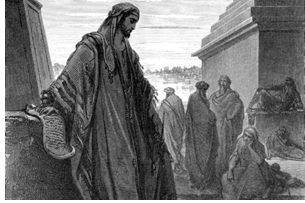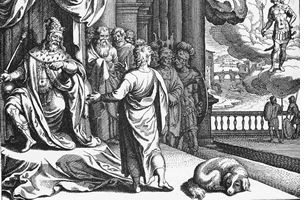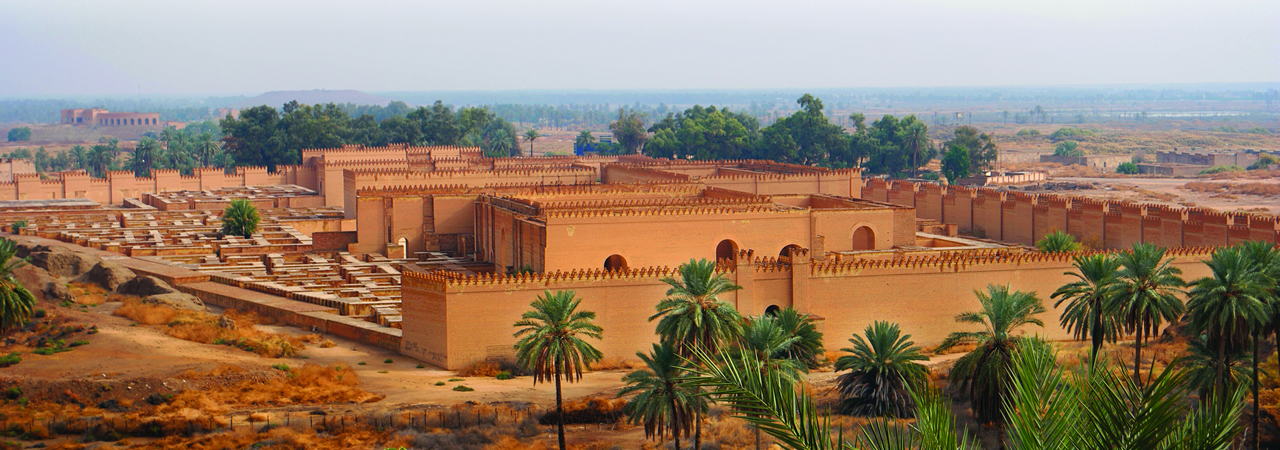The Latter Days
The sovereignty of God has already been evidenced in a twofold manner: first, in the fact that He gave the king of Judah into the hand of Nebuchadnezzar, king of Babylon (Dan 1:2); and, second, in how the Lord “granted Daniel favor and compassion in the sight of the commander of the officials” (v. 9).
Daniel 2 continues to emphasize that the Lord alone controls all things. The setting is the Babylonian court shortly after the king had a troubling dream, leading to a sleepless night (2:1).
The ancient Babylonians believed that dreams were messages from the gods; therefore, a true understanding of the vision would be vital. Nebuchadnezzar probably had other dreams which he conveyed to his advisors, and they provided their understanding. However, the dream revealed in Daniel 2 was so troubling that the king wanted to be certain regarding its meaning. Anyone could suggest significance to the dream’s symbols; however, to tell the dream itself without the king sharing the vision first, would certainly be an indication that one was divinely inspired, which is why Nebuchadnezzar demanded to make known “the dream and its interpretation.”
 Daniel was one of the king’s advisors, and prayed for God to make “the king’s matter” known to him. The dream revealed the rise and fall of several kingdoms, which was intended to instill confidence in the God who revealed such details. The God of Scripture “changes the times and the epochs” (v. 21a), proving He alone is the basis for one’s assurance.
Daniel was one of the king’s advisors, and prayed for God to make “the king’s matter” known to him. The dream revealed the rise and fall of several kingdoms, which was intended to instill confidence in the God who revealed such details. The God of Scripture “changes the times and the epochs” (v. 21a), proving He alone is the basis for one’s assurance.
THE PROBLEM
(Dan 2:1-30) Insomnia is not uncommon for people with much responsibility. The king of Babylon could not sleep, and God was the reason for his restlessness. Nebuchadnezzar had a dream that he knew was significant (Dan 2:1). God used Daniel not only to reveal His redemptive plan for Israel, but also for the nations of the world. Daniel 2 provides the most comprehensive revelation of human history in the Old Testament. God chose Daniel because his uncompromising virtue allowed him to influence the world through his prophecy. Daniel 2 provides the details of how God predestined the events of Daniel’s life to grant him the ability to interpret the dream of Nebuchadnezzar, king of Babylon.
The beginning of chapter 2 contains a historical reference: “the second year of the reign of Nebuchadnezzar.” Conservative scholarship generally regards this as the year 603 BC. The first year was counted as the year of ascension, which is why the interpretation of the dream occurred in the second year; and yet, it is also conceivable that the interpretation was subsequent to the three-year training program of Daniel. The arguments of nontraditional scholarship—that the historical references of 1:20–2:1 are contradictory and false—are based upon an obvious prejudice against the historicity of the book of Daniel.
The narrative informs the reader that the king “had dreams” (the Hebrew is pluperfect, which is translated “had dreamed dreams”). In other words, the language tells the reader that Nebuchadnezzar apparently had dreams beginning in the sequence of events of chapter 1, but not until chapter 2 were those dreams being detailed. Consequently, it is entirely possible that the dream was interpreted prior to Daniel graduating his 3-year training program.
The king demanded his advisors to tell him the dream and its interpretation, or be executed (vv. 2-9). The advisors then explained the impossibility in satisfying the king’s demand. What they admitted was that true revelation comes solely from God to humanity. Against their own inclinations, the advisors rightly stated that human beings are unable to achieve revelation (vv. 10-11). For this reason, Nebuchadnezzar furiously “gave orders to destroy all the wise men of Babylon” (v. 12), including Daniel and his friends (v. 13). His reaction is the reason why democracy is God’s blessing, since “power corrupts, and absolute power corrupts absolutely” (a well-known assertion from Lord Acton).
Nebuchadnezzar held absolute power, yet even he recognized the uselessness of false religion. Thus, he had no tolerance for supposed “wise men” who were unable to provide divine wisdom. Nevertheless, they were partially correct when they said the Lord does not dwell “with mortal flesh” (v. 11; cf. Matt 1:23). God alone could reveal the mystery of the dream, yet the king’s advisors did not know that the Spirit of the Lord does abide among humanity (1 Cor 2:11b-12: “Even so the thoughts of God no one knows except the Spirit of God. Now we have received, not the spirit of the world, but the Spirit who is from God, so that we may know the things freely given to us by God”). The wise men of Babylon did not have the Holy Spirit indwelling them, so it was impossible for them to know the dream or the interpretation. They were powerless and weak to accomplish what is God’s prerogative.
Daniel did not respond with defensiveness and outrage when told he would be executed; rather, he “replied with discretion and discernment to Arioch, the captain of the king’s bodyguard” (Dan 2:14). The crisis did not determine Daniel’s disposition; rather, it proved his temperament. With discretion and discernment, one can make peace with enemies (cf. Ps 23:5). Daniel’s request for the king to “give him time” was not a mere delay tactic, for he knew one must wait patiently upon the Lord, especially considering the present “mystery” (Dan 2:15-18). It is vital to pray when times are foreboding, when circumstances appear hopeless, when you do not know what to do next; “pray without ceasing” (1 Thess 5:16-18).
In response to prayer, God revealed “the mystery … to Daniel in a night vision” (Dan 2:17-19). Daniel did not discover the mystery; rather, God revealed it to him, which is the fundamental truth of biblical faith. It is God who reveals what is known! Certainly, one is to seek the Lord (Isa 55:6-7; Matt 6:33; Heb 11:6), yet that involves seeking what He has revealed. Biblical faith is not attempting to make discoveries with regard to God; rather, it is to comprehend what He has already revealed.
Daniel praised God for His power, revelation, and wisdom (Dan 2:20-23). Many leaders have power yet lack wisdom, which is dangerous, of course (as Lord Acton recognized). The converse is also true, since many people who are wise lack power, and so their wisdom goes unnoticed when it could benefit. God, however, is both powerful and wise; because He governs the world with wisdom, there is no reason to fear His power. God not only possesses infinite wisdom, but also shares it “generously and without reproach” to any who ask (Jas 1:5).
Having indicated that he could declare the interpretation of Nebuchadnezzar’s dream, Daniel was “hurriedly … brought into the king’s presence” (vv. 24-25). Daniel’s initial answer was a basic summary of the king’s vision (vv. 26-29). He declared the existence of an omniscient God who reveals mysteries. Whereas Daniel lacked the ability to reveal the dream, there is a God in heaven who could, and to Him he gave all the glory (v. 30).
 THE INTERPRETATION
THE INTERPRETATION
(Dan 2:31-49) Nebuchadnezzar’s dream concerned “what will take place in the latter days” (v. 28). Scripture references two time periods: the present time and the age to come. The “latter days” would be the time preceding the coming era. Daniel testified that God can and does communicate His purposes and will for humanity. He is the One who appointed the king to his position, since there is no authority except what the Lord establishes (vv. 37-38; Rom 13:1), which is a reminder to pray for those in leadership (1 Tim 2:1-2).
Daniel indicated that the king dreamt of “a single great statue” composed of varying metals (vv. 31-35). A head of gold symbolized Nebuchadnezzar, and the kingdom of Babylon in particular (vv. 36-38). “Another kingdom” would arise (Medo-Persia), and though it would conquer Babylon, it would be “inferior,” as indicated by the qualitative decrease in the precious metal to silver. Greece would be “another third kingdom of bronze” (v. 39).
Conservative scholars do not all agree concerning the identity of the actual Gentile nations represented by the kingdoms of silver and bronze; however, many believe Medo-Persia to be the second kingdom, and Greece the third. Due to continual internal strife, the Medo-Persian Empire was indeed inferior to Babylon. Under the leadership of Alexander the Great, the Greek Empire is regarded as the first empire to rule the earth. At one point in his career, Alexander lamented because he believed there were no more known worlds for him to conquer.
Four verses are devoted to Rome, “a fourth kingdom as strong as iron” (vv. 40-43), which eventually will be crushed and destroyed by the stone that will endure forever (vv. 44-45), a reference to the divine kingdom. Rome exerted tremendous force in subduing all the countries of the known world. The dream gives emphasis to the “feet and toes … partly of iron and partly of pottery,” because these elements do not mix—thus indicating that division will characterize the final form of world powers. Rome never truly fell; rather, the centralized power of Rome was divided among the emerging nations, or “toes.”
Nebuchadnezzar acknowledged Daniel’s God as the “God of gods and a Lord of kings,” and promoted the prophet and his friends (vv. 46-49). Daniel 2 reveals the course of the Gentile world powers that will emerge as rulers over the nation of Israel. The first three empires retained power within the nation, but the fourth empire results in a division of power, which causes the emergence of several nations. Once this occurs, “the stone” will crush the statue, and it will be utterly destroyed. The stone, however, is the kingdom of God that will fill the entire earth and endure forever. The kingdom of God—ruled by Jesus Christ—will be established in a coming day. God is in control of this world, including all the people in it. What an encouragement to pray sincerely, “Your kingdom come” (Matt 6:10a)!
Midnight Call - 08/2024


